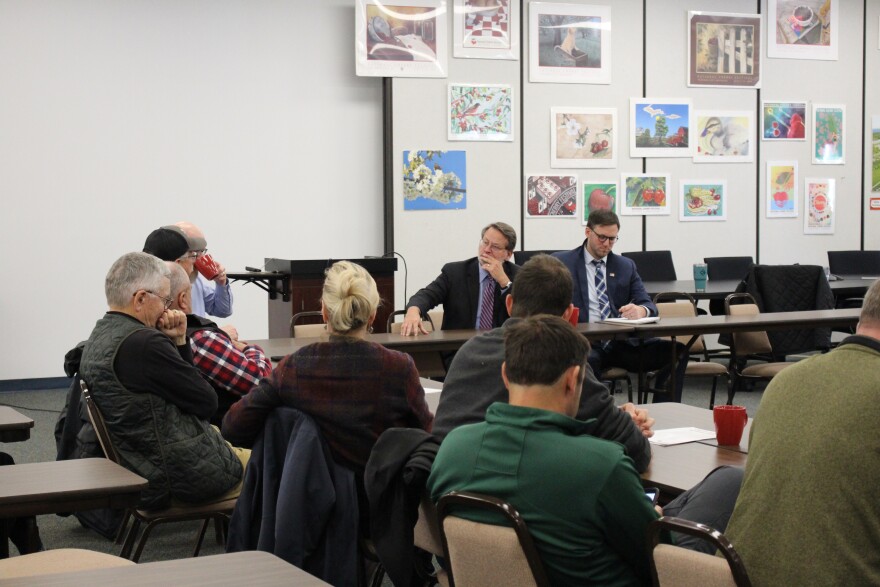Tart cherry farmers in Michigan are suffering the fallout of an international trade war. While farmers wait to see where those political cards fall, many in northern Michigan are bearing down for the winter.
Prepping for winter
After an early snowstorm in mid-November, Tom Coronado with Cherry Ke stayed warm in a tractor.
In between some tart cherry trees on an orchard in Kewadin, a worker held a 10-12 foot fence post in place. Then in his tractor, Coronado planted what looked like a stamp down on top. The tractor shoved the post into the ground, loudly rattling along the way.

Coronado planted about a dozen of these posts next to a line of young tart cherry trees. He does this work every year, along with other winter upkeep like pruning. When this fence is done, it will hopefully protect the young trees from getting eaten by deer.
"If we don't do it we battle the deer, so they'll prune the trees for us in a way we don't like," Coronado says laughing.
Every cherry matters
Every cherry that Michigan farmers can keep this winter matters, especially now. Michigan farmers have been getting priced out of the fruit market by cheap foreign competitors for years.
Since 2006 the state has lost 160 tart cherry farms, and across the country production is already down 18 percent from last year, according to the U.S. Department of Agriculture.
The industry recently got help via tariffs on Turkish cherry exporters, who were their biggest competitor.
Has that helped?
"Things haven't changed a whole lot," Cherry grower Nels Veliquette says.
He says importers have leftover cherries from Turkey, and are still selling those off instead of buying domestic ones.
"It's hard to know how long it will take for that inventory to work it's way through the system before they begin buying domestic-sourced cherries," Veliquette says.

Veliquette and other farmers told all of this to U.S. Sen. Gary Peters (D-Mich.) at a meeting in Traverse City a few weeks ago. Peters said he’ll take the message back to Washington.
"For them to understand this is not just about cherry growers in Traverse City, it's about other small manufacturers and small industries across the country," Peters said.
Earlier this year, Peters introduced a bill to make the U.S. Commerce Department investigate trade issues on behalf of small industries like cherries.
That bill is stuck in committee.
Stuck in a 'holding pattern'
Veliquette says the whole Michigan cherry industry is stuck in a “holding pattern.” One thing farmers have been waiting on are federal subsidies for lost profits from the trade war with China.
The USDA gives relief funds to farmers affected by the trade war through the Market Facilitation Program (MFP), but tart cherry farmers aren’t on the list.
Daniel Sumner with the Agricultural Issues Center at the University of California-Davis says the MFP is very broad. Because of that he says many farmers impacted by the trade war don't end up getting the help they need.
"They're not painting with a brush, they're painting with a roller. You don't get the 'Mona Lisa' done that way," Sumner says.
The MFP is set to expire in November 2020. Sumner says the program may not get renewed, and farmers concerns could fall by the wayside after next year's election.
This story was featured in Points North. You can find the full episode here.


